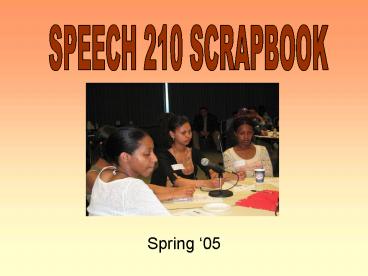Scrapbook PowerPoint PPT Presentation
1 / 10
Title: Scrapbook
1
SPEECH 210 SCRAPBOOK
Spring 05
2
Introduction to Project
- The International Service Learning Project is
a team effort sponsored by the - Speech Department and the Honors Program.
- Supports the colleges initiative on diversity
and globalism - Trains students, faculty and staff in the
conversation café technique - Occurs as conversation cafes, focusing on the
cultures of different immigrant groups
represented on campus.
3
Introduction for Speech 210
- Students in Interpersonal
- Communication (Speech 210)
- network with immigrant students
- on campus, inviting them to
- class to prepare for the cafes.
- Immigrant students stories
- provide insight into their particular
cultures and countries, as well as I into
perspectives on the experience of coming to the
U.S. and to Highline Community College. - The project engages and supports immigrant
voices and allows them to share their "cultural
capital" with the campus.
4
Skills Developed
- PERSON-CENTERED VS. POSITION CENTERED TALK
- Person-Centered talk emphasizes the uniqueness,
the person-ness, of the participants. - Position-Centered talk emphasizes the role(s)
that the people play. - One is not better than the other, but they are
different. Each is appropriate in different
places at different times to accomplish different
purposes. - Flexibility in interpersonal communication is the
ability to move from person-centered to
position-centered, and vice versa, when
appropriate. This increases the overall quality
and effectiveness of communication.
5
Person-Centered vs. Position-Centered Talk in
Speech 210
- Flexibility The more flexible you are the easier
it is to achieve project goals. - Person-Centered Viewing others from a person
centered perspective allows you to focus on each
persons uniqueness. This allows you to realize
the fact that people have their own individual
opinions and it makes it easier to collaborate
and incorporate those opinions. - Service Learning Project At times it is
impossible to be completely person-centered
because we begin from a position-centered
perspective, focusing on the immigrant student.
However, if you are flexible you can move past
this in the conversation to find out who each
person is on a deeper, more personal level. Just
coming from the same country/culture does not
mean that people will think exactly the same way.
6
Conversations
- Throughout this quarter, weve learned that
conversations are the most influential
communication events, and therefore we should
utilize them in achieving project goals. This is
accomplished by using interpersonal and
person-centered communication. - By showing genuine interests in other cultures
and individuals uniqueness we can help them to
feel more comfortable on campus and help
ourselves to overcome our stereotypes. This in
turn can help immigrant students to be
enthusiastic about coming to the Cultural Cafes
to share their cultures with other students on
campus.
7
Conversation Skills
- Some strategies that we have found to be
effective are - Negotiating the act of mutually constructing
identities and meanings. - Cosmopolitan attitude the act of working towards
alignment or coordination rather than insisting
on agreement among all perspectives - Open-sensitivity the act of expressing personal
characteristics, as well as perceiving and
responding to personal characteristics of the
other person. - Through our experience with the Service Learning
Project, weve been able to discover who students
are as position-centered immigrant students,
but also who they are as individuals. We have
also learning that culture was unique to each
individual we spoke with.
8
LISTENING
- Analytic Listening Most of us began with this
type of listening, taking in what the
international students were saying and examining
our own stereotypes. - Empathic Listening For some, our listening
method turned to empathic, as the international
students became comfortable and disclosed their
own personal stories. - Dialogic Listening Some of us, then, turned our
listening style toward dialogic. As we shifted to
conversation with the students, we shared our
personal lives and cultures, as they shared
theirs. We were able to compare and contrast not
only what was different about us, but also what
we had in common. - All three forms of listening are equally
effective when appropriate. We found that at
different times when discussing different topics,
different forms worked best.
9
Ethiopian Cultural Cafe
10
CONCLUSION
- Learning about interpersonal communication
teaches us... - that we have choices. (Communication is powerful,
and with a broader understanding of it, we can
use wise choices to improve our communication and
improve the quality of our lives.) - that one choice we can make is to respond instead
of react. We can next, choosing a strategy that
will be productive for all those involved. This
gives us the ability to take any communication
event and shift it in a positive and constructive
direction. - The International Service Learning Project has
the potential to bring about positive changes in
attitudes and behaviors on campus. It can
strengthen relationships and create cohesiveness
within the college environment.

